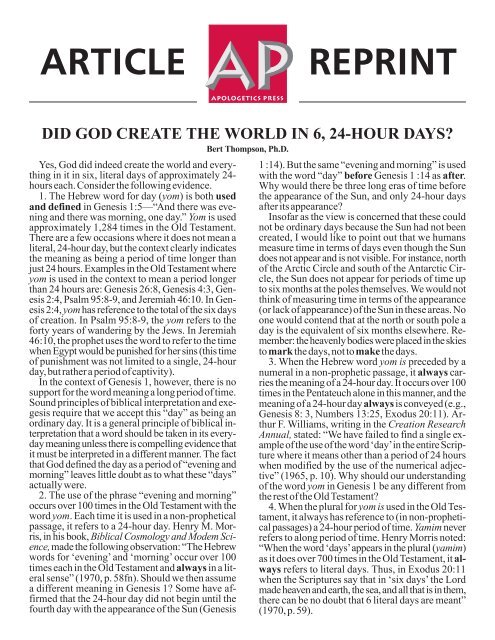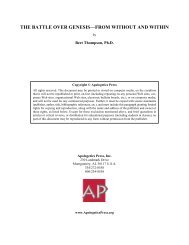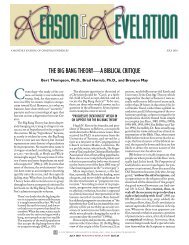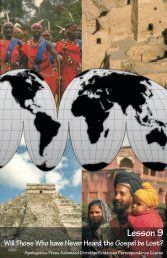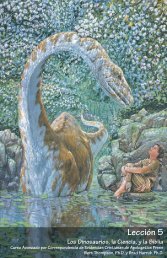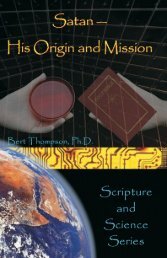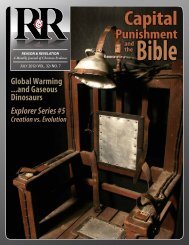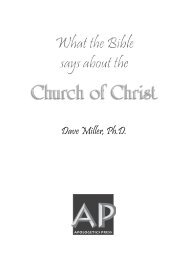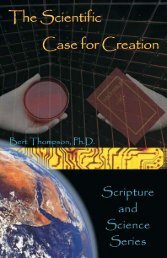did god create the world in 6, 24-hour days? - Apologetics Press
did god create the world in 6, 24-hour days? - Apologetics Press
did god create the world in 6, 24-hour days? - Apologetics Press
Create successful ePaper yourself
Turn your PDF publications into a flip-book with our unique Google optimized e-Paper software.
ARTICLEREPRINTAPOLOGETICS PRESSDID GOD CREATE THE WORLD IN 6, <strong>24</strong>-HOUR DAYS?Bert Thompson, Ph.D.Yes, God <strong>did</strong> <strong>in</strong>deed <strong>create</strong> <strong>the</strong> <strong>world</strong> and everyth<strong>in</strong>g<strong>in</strong> it <strong>in</strong> six, literal <strong>days</strong> of approximately <strong>24</strong>-<strong>hour</strong>seach.Consider<strong>the</strong>follow<strong>in</strong>gevidence.1. The Hebrew word for day (yom) is both usedand def<strong>in</strong>ed <strong>in</strong> Genesis 1:5—“And <strong>the</strong>re was even<strong>in</strong>gand <strong>the</strong>re was morn<strong>in</strong>g, one day.” Yom is usedapproximately 1,284 times <strong>in</strong> <strong>the</strong> Old Testament.There are a few occasions where it does not mean aliteral, <strong>24</strong>-<strong>hour</strong> day, but <strong>the</strong> context clearly <strong>in</strong>dicates<strong>the</strong> mean<strong>in</strong>g as be<strong>in</strong>g a period of time longer thanjust <strong>24</strong> <strong>hour</strong>s. Examples <strong>in</strong> <strong>the</strong> Old Testament whereyom is used <strong>in</strong> <strong>the</strong> context to mean a period longerthan <strong>24</strong> <strong>hour</strong>s are: Genesis 26:8, Genesis 4:3, Genesis2:4, Psalm 95:8-9, and Jeremiah 46:10. In Genesis2:4, yom has reference to <strong>the</strong> total of <strong>the</strong> six <strong>days</strong>of creation. In Psalm 95:8-9, <strong>the</strong> yom refers to <strong>the</strong>forty years of wander<strong>in</strong>g by <strong>the</strong> Jews. In Jeremiah46:10, <strong>the</strong> prophet uses <strong>the</strong> word to refer to <strong>the</strong> timewhen Egypt would be punished for her s<strong>in</strong>s (this timeof punishment was not limited to a s<strong>in</strong>gle, <strong>24</strong>-<strong>hour</strong>day,butra<strong>the</strong>raperiodofcaptivity).In <strong>the</strong> context of Genesis 1, however, <strong>the</strong>re is nosupport for <strong>the</strong> word mean<strong>in</strong>g a long period of time.Sound pr<strong>in</strong>ciples of biblical <strong>in</strong>terpretation and exegesisrequire that we accept this “day” as be<strong>in</strong>g anord<strong>in</strong>ary day. It is a general pr<strong>in</strong>ciple of biblical <strong>in</strong>terpretationthat a word should be taken <strong>in</strong> its everydaymean<strong>in</strong>g unless <strong>the</strong>re is compell<strong>in</strong>g evidence thatit must be <strong>in</strong>terpreted <strong>in</strong> a different manner. The factthat God def<strong>in</strong>ed <strong>the</strong> day as a period of “even<strong>in</strong>g andmorn<strong>in</strong>g” leaves little doubt as to what <strong>the</strong>se “<strong>days</strong>”actuallywere.2. The use of <strong>the</strong> phrase “even<strong>in</strong>g and morn<strong>in</strong>g”occurs over 100 times <strong>in</strong> <strong>the</strong> Old Testament with <strong>the</strong>word yom. Each time it is used <strong>in</strong> a non-propheticalpassage, it refers to a <strong>24</strong>-<strong>hour</strong> day. Henry M. Morris,<strong>in</strong> his book, Biblical Cosmology and Modem Science,made<strong>the</strong> follow<strong>in</strong>g observation: “The Hebrewwords for ‘even<strong>in</strong>g’ and ‘morn<strong>in</strong>g’ occur over 100times each <strong>in</strong> <strong>the</strong> Old Testament and always <strong>in</strong> a literalsense” (1970, p. 58fn). Should we <strong>the</strong>n assumea different mean<strong>in</strong>g <strong>in</strong> Genesis 1? Some have affirmedthat <strong>the</strong> <strong>24</strong>-<strong>hour</strong> day <strong>did</strong> not beg<strong>in</strong> until <strong>the</strong>fourth day with <strong>the</strong> appearance of <strong>the</strong> Sun (Genesis1 :14). But <strong>the</strong> same “even<strong>in</strong>g and morn<strong>in</strong>g” is usedwith <strong>the</strong> word “day” before Genesis 1 :14 as after.Why would <strong>the</strong>re be three long eras of time before<strong>the</strong> appearance of <strong>the</strong> Sun, and only <strong>24</strong>-<strong>hour</strong> <strong>days</strong>afteritsappearance?Insofar as <strong>the</strong> view is concerned that <strong>the</strong>se couldnot be ord<strong>in</strong>ary <strong>days</strong> because <strong>the</strong> Sun had not been<strong>create</strong>d, I would like to po<strong>in</strong>t out that we humansmeasure time <strong>in</strong> terms of <strong>days</strong> even though <strong>the</strong> Sundoes not appear and is not visible. For <strong>in</strong>stance, northof <strong>the</strong> Arctic Circle and south of <strong>the</strong> Antarctic Circle,<strong>the</strong> Sun does not appear for periods of time upto six months at <strong>the</strong> poles <strong>the</strong>mselves. We would notth<strong>in</strong>k of measur<strong>in</strong>g time <strong>in</strong> terms of <strong>the</strong> appearance(orlackofappearance)of<strong>the</strong>Sun<strong>in</strong><strong>the</strong>seareas.Noone would contend that at <strong>the</strong> north or south pole aday is <strong>the</strong> equivalent of six months elsewhere. Remember:<strong>the</strong>heavenlybodieswereplaced<strong>in</strong><strong>the</strong>skiestomark<strong>the</strong><strong>days</strong>,nottomake<strong>the</strong><strong>days</strong>.3. When <strong>the</strong> Hebrew word yom is preceded by anumeral <strong>in</strong> a non-prophetic passage, it always carries<strong>the</strong> mean<strong>in</strong>g of a <strong>24</strong>-<strong>hour</strong> day. It occurs over 100times <strong>in</strong> <strong>the</strong> Pentateuch alone <strong>in</strong> this manner, and <strong>the</strong>mean<strong>in</strong>g of a <strong>24</strong>-<strong>hour</strong> day always is conveyed (e.g.,Genesis 8: 3, Numbers 13:25, Exodus 20:11). ArthurF. Williams, writ<strong>in</strong>g <strong>in</strong> <strong>the</strong> Creation ResearchAnnual, stated: “We have failed to f<strong>in</strong>d a s<strong>in</strong>gle exampleof <strong>the</strong> use of <strong>the</strong> word ‘day’<strong>in</strong> <strong>the</strong> entire Scripturewhere it means o<strong>the</strong>r than a period of <strong>24</strong> <strong>hour</strong>swhen modified by <strong>the</strong> use of <strong>the</strong> numerical adjective”(1965, p. 10). Why should our understand<strong>in</strong>gof <strong>the</strong> word yom <strong>in</strong> Genesis 1 be any different from<strong>the</strong>restof<strong>the</strong>OldTestament?4. When <strong>the</strong> plural for yom is used <strong>in</strong> <strong>the</strong> Old Testament,it always has reference to (<strong>in</strong> non-propheticalpassages) a <strong>24</strong>-<strong>hour</strong> period of time. Yamim neverrefers to along period of time. Henry Morris noted:“When <strong>the</strong> word ‘<strong>days</strong>’appears <strong>in</strong> <strong>the</strong> plural (yamim)as it does over 700 times <strong>in</strong> <strong>the</strong> Old Testament, it alwaysrefers to literal <strong>days</strong>. Thus, <strong>in</strong> Exodus 20:11when <strong>the</strong> Scriptures say that <strong>in</strong> ‘six <strong>days</strong>’ <strong>the</strong> Lordmade heaven and earth, <strong>the</strong> sea, and all that is <strong>in</strong> <strong>the</strong>m,<strong>the</strong>re can be no doubt that 6 literal <strong>days</strong> are meant”(1970,p.59).
ARTICLE REPRINT DID GOD CREATE THE WORLD IN 6, <strong>24</strong>-HOUR DAYS? Bert Thompson, Ph.D.5.TheHebrewwordolammeansalongperiodoftime. Why <strong>did</strong> not Moses employ this term if hewanted to convey <strong>the</strong> mean<strong>in</strong>g that <strong>the</strong> creation tookplace over long geological periods of time? Obviously,he <strong>did</strong> not want us to understand Genesis 1 <strong>in</strong>this manner. There are o<strong>the</strong>r words Moses could haveusedaswell,bu<strong>the</strong><strong>did</strong>not.Heused<strong>the</strong>Hebrewwordyom.6. How could <strong>the</strong>se “<strong>days</strong>” of Genesis 1 be longperiods of time when <strong>the</strong> plants were <strong>create</strong>d on <strong>the</strong>third day, and <strong>the</strong> Sun was not <strong>create</strong>d until <strong>the</strong> fourthday? If <strong>the</strong>se were geological ages of millions ofyears, <strong>the</strong>n how <strong>did</strong> <strong>the</strong> plants survive without <strong>the</strong>Sun for millions of years of total darkness? Rememberthat <strong>the</strong> phrase “even<strong>in</strong>g and morn<strong>in</strong>g” is usedafter each of <strong>the</strong> six creation <strong>days</strong>, <strong>in</strong>clud<strong>in</strong>g day three.That would mean that <strong>the</strong>re would have to be alongperiod of “even<strong>in</strong>g” and a long period of “morn<strong>in</strong>g.”This, of course, would be disastrous for <strong>the</strong> plant<strong>world</strong>(<strong>create</strong>dondaythree).And consider ano<strong>the</strong>r important fact concern<strong>in</strong>g<strong>the</strong>botanical<strong>world</strong>.Numerousspeciesofplantsmusthave<strong>in</strong>sectstoreproduce,for<strong>the</strong>se<strong>in</strong>sectshelpcrosspoll<strong>in</strong>atesuch plants (e.g.: <strong>the</strong> Pronuba moth and <strong>the</strong>yucca plant). How <strong>did</strong> <strong>the</strong>se plants survive for millionsor billions of years without <strong>the</strong>ir much-neededfriends, <strong>the</strong> <strong>in</strong>sects, which accord<strong>in</strong>g to <strong>the</strong> Genesisaccount were not <strong>create</strong>d until after day four?7. If <strong>the</strong> six <strong>days</strong> of creation were long periods oftime, <strong>the</strong>n <strong>the</strong> seventh day would logically be <strong>the</strong>same. S<strong>in</strong>ce Exodus 20:11 states that God “rested”on <strong>the</strong> seventh day, s<strong>in</strong>ce Genesis 2:1-3 states thatGod “f<strong>in</strong>ished” His creat<strong>in</strong>g and rested, and s<strong>in</strong>ceadvocates of <strong>the</strong> Day-Age <strong>the</strong>ory say that we are now<strong>in</strong> <strong>the</strong> seventh day, <strong>the</strong>n obviously God must still berest<strong>in</strong>g.ButJesusHimselfsaidjust<strong>the</strong>oppositewhenHe stated <strong>in</strong> John 5:17: “My Fa<strong>the</strong>r worketh evenuntil now.” Obviously, <strong>the</strong> seventh day was not a longperiodoftime;thus,<strong>the</strong>o<strong>the</strong>rsixwerenotei<strong>the</strong>r.8. The creation <strong>days</strong> were <strong>24</strong>-<strong>hour</strong> <strong>days</strong> becauseof pla<strong>in</strong> statements made about <strong>the</strong>m <strong>in</strong> Scripture.“In six <strong>days</strong> Jehovah made heaven and earth” (Exodus20:11). “For He spake, and it was done; He commanded,and it stood fast” (Psalm 33:9). Do <strong>the</strong>seversesimplyalongperiodofevolutionaryprocesses?“Let <strong>the</strong>m praise <strong>the</strong> name of Jehovah; for He commanded,and <strong>the</strong>y were <strong>create</strong>d” (Psalm 148:5).9. God commanded <strong>the</strong> Jews <strong>in</strong> Exodus 20:8-11to observe <strong>the</strong> Sabbath Day. He even told <strong>the</strong>m why.God said <strong>the</strong>y were to work six <strong>days</strong> and rest on <strong>the</strong>seventh because that was <strong>the</strong> pattern He had followed<strong>in</strong>creat<strong>in</strong>g<strong>the</strong>Universe.Question:How<strong>did</strong><strong>the</strong>Jews,<strong>in</strong> Old Testament times, <strong>in</strong>terpret this passage? Did<strong>the</strong>y work for a long, <strong>in</strong>def<strong>in</strong>ite period of time and<strong>the</strong>n rest for a long, <strong>in</strong>def<strong>in</strong>ite period of time? Ofcourse not! They understood and practiced exactlywhat God commanded. They worked six <strong>days</strong> andrested one day, because that is <strong>the</strong> pattern God hadused <strong>in</strong> His creation of <strong>the</strong> <strong>world</strong> <strong>the</strong>y <strong>in</strong>habited.10. From Genesis 1:16, we learn that God made<strong>the</strong> Sun and <strong>the</strong> Moon—<strong>the</strong> greater to rule <strong>the</strong> day,and <strong>the</strong> lesser to rule <strong>the</strong> night. S<strong>in</strong>ce <strong>the</strong> <strong>days</strong> weredivided <strong>in</strong>to “even<strong>in</strong>g and morn<strong>in</strong>g,” we would havetoassume(if<strong>the</strong><strong>days</strong>wereeonsoftime)that<strong>the</strong>Suncame up but <strong>did</strong> not go down for millions or billionsofyears.Isthisfeasible?11. Genesis 1:14 says that God <strong>create</strong>d <strong>the</strong> lightsto divide <strong>the</strong> day from <strong>the</strong> night, and that <strong>the</strong>y wereto be for “signs, for seasons, for <strong>days</strong>, and for years.”If <strong>the</strong> <strong>days</strong> are ages, <strong>the</strong>n what are <strong>the</strong> years? If a dayis an age, <strong>the</strong>n what is a night? In o<strong>the</strong>r words, <strong>the</strong>whole passage becomes ridiculous when we beg<strong>in</strong>tostretchorre-<strong>in</strong>terpret<strong>the</strong>word“day.”12. Genesis 2:1 reads, “And <strong>the</strong> heaven and <strong>the</strong>earth were f<strong>in</strong>ished, and all <strong>the</strong> host of <strong>the</strong>m.” Godf<strong>in</strong>ished His creation on <strong>the</strong> sixth day. If <strong>the</strong>se werelong geological periods and <strong>the</strong> means of creationwere evolution, why does <strong>the</strong> Bible state that <strong>the</strong> evolutionaryprocessendedwith<strong>the</strong>sixthday?CONCLUSIONThe evidence is overwhelm<strong>in</strong>gly <strong>in</strong> favor of <strong>the</strong><strong>days</strong> of Genesis 1 be<strong>in</strong>g literal, <strong>24</strong>-<strong>hour</strong> <strong>days</strong>. Thereis absolutely no evidence to support <strong>the</strong> <strong>the</strong>ory that<strong>the</strong><strong>days</strong>were“ages”ofevolutionarytime.REFERENCESMorris, Henry M. (1970), Biblical Cosmology and ModernScience (Grand Rapids, MI: Baker).Williams, Arthur F. (1965), Creation Research Annual(Ann Arbor, MI: Creation Research Society).ARTICLE REPRINTDistributed by<strong>Apologetics</strong> <strong>Press</strong>, Inc.230 Landmark DriveMontgomery, AL 36117-2752(334) 272-8558


